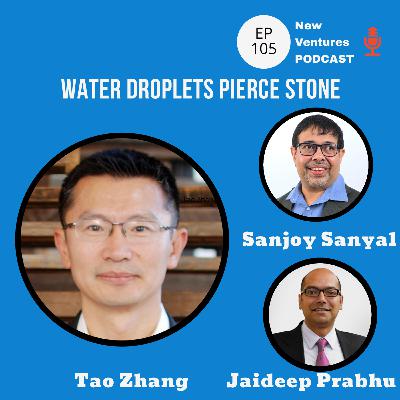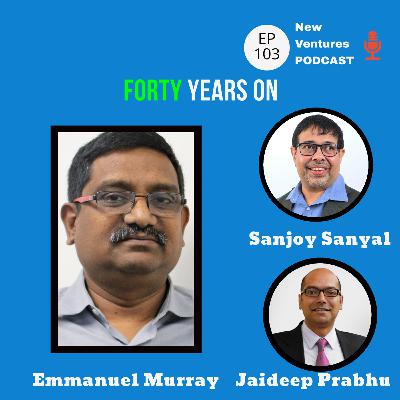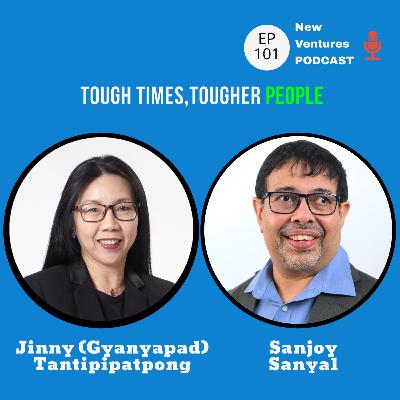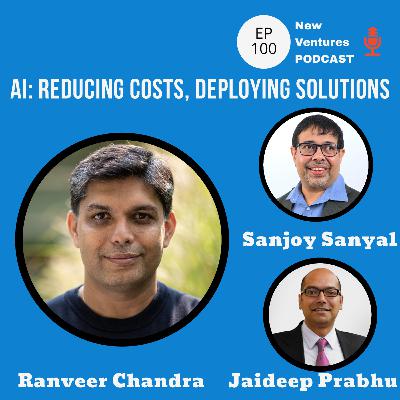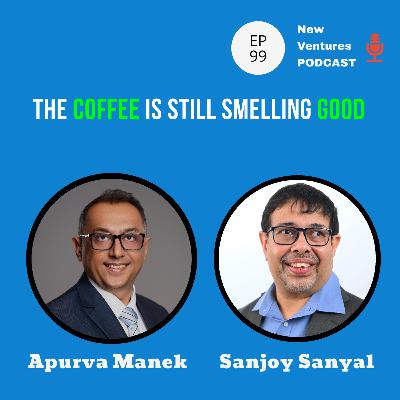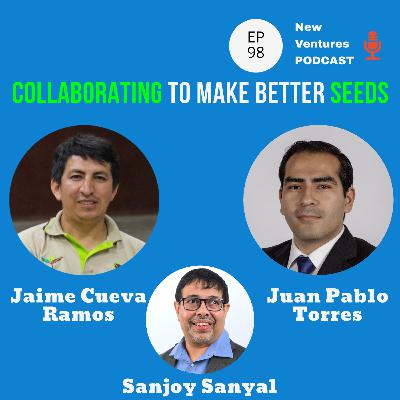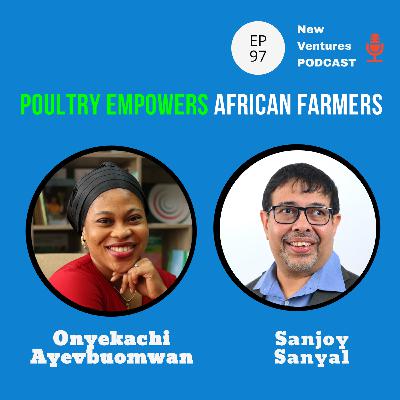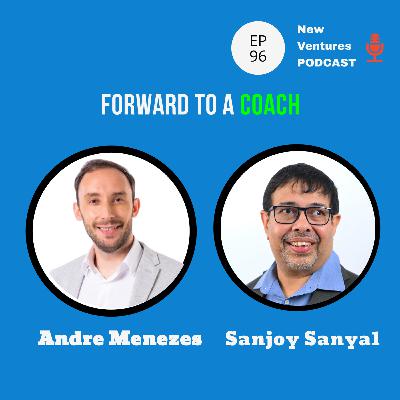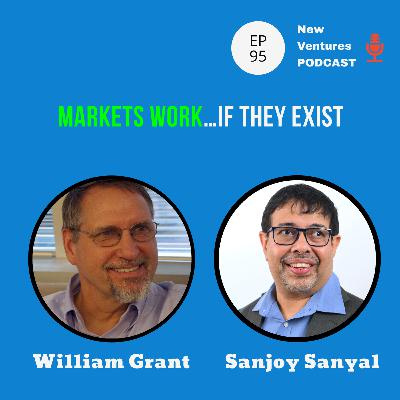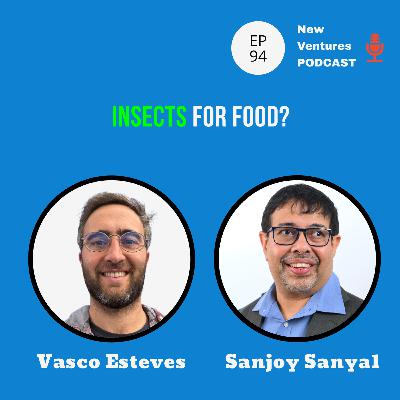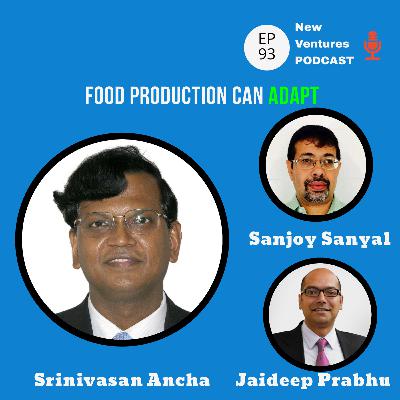Discover New Ventures Podcast
New Ventures Podcast

109 Episodes
Reverse
What is the problem ? Fertiliser application needs to be balanced according to the needs of the soil but often nitrogenous fertilisers tend to be overused.What is the solution ? Bring on-line potash deposits in various parts of the world. This will reduce geo-political risks and stabilise pricesWhat is the evidence? The team behind Millennial Potash is advancing a large scale potash development along Gabon’s southern coast.What is the caveat? Developing potash projects takes time and skills. What should organisations do ? Fertiliser companies across the world can discuss with Millennial Potash for off-take arrangements.SectionsSection 1: First 10 minutes : About Farhad Abasov and this potash project.Section 2: Next 25 minutes: The importance of potash in food security.Section 3: Last 30 minutes: About implementing this potash project.Host: Sanjoy Sanyal, Founder Regain Paradisewww.regainparadise.orgGuest: Farhad Abasov, Chairman Millennial Potashhttps://millennialpotash.com/Date : 21st December, 2025
What is the problem ? China is the largest market for meat and seafood and in places like Hong Kong per capita consumption of meat is close to US levels.What is the solution ? Chinese food entrepreneurs must come up with new products and this has to be supplemented by local governments pushing on multiple fronts: ecological farming, traditional food, reducing food waste.What is the evidence? There is vibrant entrepreneurial activity, mainstream investment and interest among young customers.What is the caveat? Alternative proteins will take time to be accepted by demanding Chinese customers.What should organisations do ? Organisations – both public and private – need to be patient. Customers cannot be forced into choosing.Sections Section 1: First 10 minutes : About Tao and how he got into investing in food.Section 2: Next 15 minutes: About the changing food habits in China.Section 3: Last 25 minutes: Trends in Chinese food innovation.Host : Sanjoy Sanyal, Founder Regain Paradisewww.regainparadise.orgGuest : Tao Zhang, Founder and Managing Director , Dao Ventureshttps://www.linkedin.com/in/tzhang1/https://www.daofoods.com/Date : 9th Nov, 2025
What is the problem ? The funding crisis will exacerbate at the exact time when the impacts of climate change will aggravate.What is the solution ? Improved practices, irrigation, seeds and preservation of nature.What is the evidence? Seeds resilient to climate change which show no yield lossare being developed and being adopted by farmers.What is the caveat? Emissions in sectors such as energy and transport have to come down first. If they don’t the agriculture will come up against hard limits to adaptation.What should organisations do ? Organisations both in the public and private sector, need to accelerate research and deployment of climate technologies.SectionsSection 1: First 10 minutes : About Aditi and how her work led to policy changes in India.Section 2: Next 40 minutes: About CGIAR’s work in climate change.Host :Sanjoy Sanyal, Founder Regain Paradisewww.regainparadise.orgGuest :Aditi Mukherji, Principal Scientist International Livestock Researchhttps://www.linkedin.com/in/aditi-mukherji-696bbb2b/https://scholar.google.com/citations?user=Cv7woCMAAAAJ&hl=enhttps://www.cgiar.org/aditi-mukherji/Date : 18th October 2025
What is the problem ?How should India’s agritech companies providing advisory services become profitable.What is the solution ?They need to partner with each other, they need to partner with FPOs. Ideally large companies must partner with them.What is the evidence? There is enough evidence that companies and organisations can grow to significant levels even without significant equity funding.What is the caveat? Entrepreneurs are too busy with their own things . They feel that they can bypass and undercut the FPO. The large companies have not woken up to the importance of partnering with agritech companies .What should organisations do ? Large companies need to learn to partner with startups. Entrepreneurs need to stop believing that they can do everything.SectionsSection 1: First 10 minutes : About Emmanuel , his career.Section 2: Next 15 minutes: Emmanuel’s investing experienceSection 3: Last 30 minutes: India’s agriculture and agri-tech sector.Host:Sanjoy SanyalFounder Regain Paradisewww.regainparadise.orgGuest: Emmanuel MurrayInvestment Director Caspian Leap for Agriculture (LeAF) Fund.linkedin.com/in/emmanuel-murrayemmanuel@caspian.inevmurray@gmail.com+91 97037 6999724th September ,2025
What is the problem ? Climate change will bring opportunities for UK farmers in the UK but farmers need support to take advantage of potential opportunities.What is the solution ? Farming has to be more profitable and farming organisations must help farmers to adopt innovations.What is the evidence? Regenerative farming practices have been spreadingamong British farmers.What is the caveat? Farming is not really profitable.What should organisations do?Make farming more profitable, support applied research and support ways to propagate innovations.SectionsSection 1: First 5 minutes : Introduction to Ali , her farm and her career.Section 2: Next 50 minutes: Opportunities and risks of climate change and the ability of growers to innovate and adapt.Section 3: Last 10 minutes: Food security in the UKHost: Sanjoy Sanyal, Founder Regain Paradisewww.regainparadise.orgGuest: Ali CapperOwner of Stocks Farm, Ex Chairperson of the National Farmers Union Horticulture & Potatoes Board. Director of the Oxford Farming Conference, Chairperson of theBritish Apples and Pears and Chairperson of Wye Hops.https://stocksfarm.net/https://www.linkedin.com/in/alison-capper-71163813/Date : 8th September, 2025
What is the problem ?The El Nino has affected pineapple production in Thailand.What is the solution ?Some companies are quitting the industry altogether. Ourguest – who has literally grown up in the pineapple industry- is “doubling down”but diversifyingWhat is the evidence? Pineapple leaves which would have wasted can be used tomake sustainable textiles.What is the caveat? Demand for these textiles is lower than expected.What should organisations do ? They should diversify to manage risks, not give in.Easier said that done, of course.Sections Section 1: First 8 minutes : Introduction to Jinny (Ghanyapad) Tantipipatpong and her family businessSection 2: Next 22 minutes: The impact of the El Nino on the pineapple industry in ThailandSection 3: Next 23 minutes: The plans of converting pineapple waste leaves to sustainable textile fibresHost:Sanjoy Sanyal, Founder Regain Paradisewww.regainparadise.orgGuest:Jinny (Ghanyapad) TantipipatpongExecutive Director of the Siam Agro-Food Industry and the Director of the ThaiDesignation Pineapple Canning Industry Corporationhttps://www.saico.co.th/home/jinny@tpc-canning.comWA: +66(0)81 813 6288
What is the problem ? Business models to deploy AI solutions for small holder farmers do not exist.What is the solution ? Bring down costs and develop use cases in partnership.What is the evidence? Several cost reduction technologies and several real lifeapplications are being developed.What is the caveat? We are just scratching the surface.What should organisations do? Companies should partner to test and deploy solutions.Sections Section 1: First 10 minutes : Getting to know Ranveer Chandra.Section 2: Next 40 minutes: Microsoft’s strategy in AI for agriculture.Host:Sanjoy SanyalFounder Regain Paradisewww.regainparadise.orgGuest : Ranveer ChandraVice President and CTO Agri-food, Microsofthttps://www.linkedin.com/in/ranveer-chandra-79bb9b/Date : 31st July 2025
What is the problem ? Coffee production and exports have boomed in Vietnam . The issue is to keep the boom going.What is the solution ? Doing much the same things that contributed to the boomin the first place. Organising farmers, supporting them with information and working with buyersWhat is the evidence? In Vietnam farmers have options to hold on to their cropsWhat is the caveat? The futures market could increase price volatilityWhat should organisations do ? Companies should secure supplies from farmersSectionsSection 1: First 10 minutes : Getting to know Apurva.Section 2: Next 35 minutes: about coffee industry in Vietnam, how it has grown and how it is managing.Host: Sanjoy Sanyal, Founder Regain Paradise, New Ventureswww.regainparadise.orgwww.regainparadise.orgGuest: Apurva ManekVeteran coffee trader from Southeast Asiahttps://www.linkedin.com/in/apurva-manek-44774b52/apurvamanek1407@gmail.com21st July, 2025
What is the problem ? Coffee production in Peru has improved significantly. It is now being affected by climate change.What is the solution ?A cooperative with research and training focus to help farmers improve quality and adopt appropriate seeds.What is the evidence? Peru coffee which used to sell at a discount is now sold as a premiumWhat is the caveat? Would cooperatives have the ability to invest and hire in an era of climate change?What should organisations do ? Cooperatives can help small holder farmers.Sections Section 1: First 15 minutes : Getting to know our guests.Section 2: Next 45 minutes: How Centrocafe works with farmers in Peru and plans to address climate changeHost: Sanjoy SanyalFounder Regain ParadiseNew Ventureswww.regainparadise.orgGuests: Jaime Cueva RamosHead of Productive and Associative Sustainability Managementhttps://www.linkedin.com/in/jaime-cueva-ramos-23340b129/ https://cenfrocafe.com.pe/Juan Pablo TorresSupply Chain Experthttps://www.linkedin.com/in/juan-pablo-170785/Date : 17th July 2025
What is the problem? Nigeria is importing meat even as its potential to produce domestically is untapped.What is the solution ? Create linkages between small holder farmers and meat companies.What is the evidence? Farmers in Nigeria are already benefiting..What is the caveat? Farmers need training and services (inputs, purchase agreements, insurance)What should organisations do? Non-profits and companies should work together to create these marketsSections Section 1: First 10 minutes : Getting to know Kachi and Heifer’s work in Nigeria.Section 2: Next 45 minutes: about the Sustainable Market Access for smallholder Poultry Farmers.Section 3: Last 10 minutes about broader lessons.Host : Sanjoy Sanyal, Founder Regain Paradisewww.regainparadise.orgGuest : Onyekachi AyevbuomwanProgram Lead for the Livestock sector for Heifer International Nigeriahttps://www.linkedin.com/in/onyekachi-ayevbuomwan-5666a66b/?originalSubdomain=ngDate 30th June 2025
What is the problem ? Markets need to be found: for imperfect and traditional vegetables, for cellular agriculture outputs.What is the solution ? Products that meet needs: nutritious and tasty snacks, substitutes for in-demand products.What is the evidence? Customers are accepting new products.What is the caveat? It takes time to build products and markets.What should organisations do ? Scale through niche markets and conserve capital.Sections Section 1: First 10 minutes : Getting to know how Andre’s life has changed in the last three yearsSection 2: Next 25 minutes: about the three companies Andre is working with now.Section 3: Last 10 minutes about plant based industry and capital conservancy.Host : Sanjoy Sanyal, Founder Regain Paradise New Ventures www.regainparadise.orgGuest : Andre Menezes Founder . Investor https://www.linkedin.com/in/andre-menezes/Date : June 5th, 2025
What is the problem ? In poor counties farmers are producing too little food. Productivity levels are very low.What is the solution ? Help companies sell inputs to farmers, help farmers sell and save moneyWhat is the evidence? In Mozambique the seed market has expanded by 6 times and now there are local entrepreneurs working with small holder farmers.What is the caveat? It takes time. Public sector, NGOs and donors may disrupt the market.What should organisations do ? Provide information bring buyers and sellers together.Sections Section 1: First 15 minutes : Getting to know William and the concept of market systems development.Section 2: Next 25 minutes: about the experience in Mozambique.Section 3: Last 20 minutes about how the approach can be replicated in an age of funding reduction.Host: Sanjoy SanyalFounder Regain Paradisewww.regainparadise.orgGuest : William GrantMarket Systems Developmenthttps://www.linkedin.com/in/william-grant-9879723/
What is the problem? Animal protein contributes to disproportionately large amount of emissions. What is the solution? Insect feed can be solution. They can be a nutritional additive for the food we eat. They can also be a substitute for animal feed. What is the evidence? Insect feed has got to the point where it has moved to commercial production. Insect feed can be produced using waste from breweries and markets which is an added advantage. Yet another advantage is that the byproduct is organic fertilisers. What is the caveat? However costs are still high. What should organisations do? Animal feed and food supplement companies should partner with start ups to be able to generate economies of scale. Organisations producing waste should consider using the waste as feed to this innovative industry. SectionsSection 1: First 15 minutes : Getting to know Vasco.Section 2: Next 20 minutes: about the applications of insect food.Section 3: Last 15 minutes about Tecmafood’s business model. Host: Sanjoy Sanyal, Founder Regain Paradise www.regainparadise.orgGuest : Vasco Teixeira EstevesCEO Tecmafoods President, Portugal Insecthttps://pt.linkedin.com/in/vascosteixeiraestevesgeral@tecmafoods.com22nd April 2025
What is the problem ? We have to increase food production in the face of climate change , we have to make vulnerable communities resilient and we have to do all this without increasing emissions.What is the solution ? There are numerous climate smart technologies and practices.What is the evidence? There are several examples in the ASEAN region where food production is increasing in the face of climate change even as producers adopt sustainable practices.What is the caveat? People need to be convinced about the economic benefits of sustainable solutionsWhat should organisations do ? Banks should discuss sustainability with their clients, Companies need to work on sustainable supply chains and NGOs need to support small producers to make more money through sustainable practices.Sections Section 1: First 10 minutes : Getting to know Srinivasan.Section 2: Next 20 minutes: about the impacts of ADB’s projects.Section 3: Last 30 minutes about the lessons from ADB’s projects.Host: Sanjoy SanyalFounder Regain Paradisewww.regainparadise.orgCo-Host : Jaideep Prabhu Professor of Business, University of CambridgeGuest : Srinivasan AnchaPrincipal Climate Change Specialist of the Asian Development Bank.https://www.linkedin.com/in/srinivasan-ancha-44941211/asrinivasan2009@gmail.comDate : 13/03/2025
What is the problem ? The amount of water available for irrigation and livestock is reducing. Safe drinking water is also not available in many parts of the world.What is the solution ? Getting to the root of the problem, identifying the causes, adopting locally specific interventions and involving the community.What is the evidence? Even in the areas of Bangladesh where saline water from the sea is creeping in it is possible to have enough fresh water and grow more food. What is the caveat? There is a propensity on the part of governments to deploy large infrastructural projects which add to the problem.What should organisations do ? Deploy appropriate solutions and keep vigil. Its easy to slip back. Think processes not projects.Sections Section 1: First 9 minutes : Getting to know Andrew and learning about his work.Section 2: Next 9 minutes: About the problemSection 3: Last 35minutes : About the lessons from Andrew’s projects.Host: Sanjoy Sanyal, Founder Regain ParadiseNew Ventures www.regainparadise.orgGuest : Andrew JenkinsInternational Water Experthttps://www.linkedin.com/in/andrew-jenkins-16553814/andrew@jenkins.associatesDate: February 14, 2025.
What is the problem ? Agricultural practices is depleting the soil fertility and making farming unproductive.
What is the solution ? Regenerative farming , integrating trees and livestock in farming operations. Integrating trees is called agro forestry.
What is the evidence? Agroforestry has worked in Africa (Niger, Zambia), Asia (China and India), South America (Argentina) and Western nations as well.
What is the caveat? There is no one “miracle tree” and “no one miracle practice”.
It all depends on the context. Top down approaches don’t help.
What should organisations do ? NGOs and agricultural support organisations should help farmers adopt these practices.
Sections
Section 1: First 14 minutes : Getting to know Patrick and understanding all the terms.
Section 2: Next 35 minutes: about the why and the how of agro forestry.
Section 3: Last five minutes about what is not broken about the world food system
Host: Sanjoy Sanyal, Founder Regain Paradise
www.regainparadise.org
Guest: Patrick Worms, Senior Science Policy Adviser for the World Agroforestry Centre
https://www.linkedin.com/in/pworms/
https://www.cifor-icraf.org/
Diageo is reducing its emissions by innovating in its packaging. It is trying to introduce circular economy in the traditional glass bottles. The company is also trying to use new types of material: aluminum and paper. At the same time, Diageo faces climate risks. Agricultural commodities and water are the inputs to manufacturing your favour beverages. In response, Diageo is supporting regenerative agriculture and water conservation projects.
Innovation involves working thoughtfully with partners (start-ups and non-profits). It also involves crucially a high tolerance of failure. Mark Sandys is the Chief Innovation Officer at Diageo, the British multinational alcohol beverage company.
Sections
Section 1: First 18 minutes : Getting to know Mark and understand Diageo’s approach to innovation.
Section 2: Next 31 minutes about Diageo’s innovations in packaging.
Section 3: Last six minutes about climate risks and Diageo’s response.
Host : Sanjoy Sanyal, Founder Regain Paradise
www.regainparadise.org
Guest : Mark Sandys
Chief Innovation Officer, Diageo
https://www.linkedin.com/in/mark-sandys-b629b6b8/
https://www.diageo.com/en
Digital innovation in agriculture is already bringing solutions to farmers that helps them use their mobile phones to obtain a range of useful services. They can get information about product prices and advice on pest control. They can also buy farm inputs as well sell their products. Almost always underbanked, they can also get credit. Is AI adding an extra fizz to these solutions? We discussed with Daniele Tricarico about the GSMA report AI for Africa: Use cases delivering impact.
We learnt that AI is adding an extra layer of additional benefits to these existing solutions and also helping develop some new solutions (such as better weather predictions and tracking food security). Both machine learning and generative AI are being used in these applications. Grant capital is available to develop initial pilots. Local talent who knows the agricultural landscape and brainy young people who work on the data and the programming are there as well. Companies are working around the problem of lack of data. Partnerships of start-ups with large IT companies and with mobile networks is critical to deployment of solutions.
Sections
Section 1: First 5 minutes : introduction
Section 2: Next 54 minutes the AI use cases in food and agriculture
Host : Sanjoy Sanyal, Founder Regain Paradise
New Ventures
www.regainparadise.org
Guest : Daniele Tricarico
Senior Director, Central Insights & Monitoring & Evaluation, Mobile for Development
https://www.linkedin.com/in/danieletricarico/
https://www.gsma.com/solutions-and-impact/connectivity-for-good/mobile-for-development/gsma_people/daniele-tricarico/
Too much food is wasted by consumers. Reducing this wastage is important. It is good for the climate and for one’s own wallet, not to mention the conscience.
Everybody agrees that it is important and yet reducing food waste is hard. People waste food not because they don’t care but often they do not know better ways to buy, store, cook and eat. Luckily, there are a whole set of tools from the discipline of psychology to help people become aware and have the right skills and behaviour.
Dr. Sophie Attwood behavioural scientist and a thought leader on sustainable food and heath choices. She holds a doctorate degree from the University of Cambridge and has worked with the global think tank WRI. In the podcast she also touches upon how companies who are developing solutions for the problem of food waste and selling plant based meats could market their products.
Sections
Section 1: First 8 minutes : introduction
Section 2: Next 34 minutes about food waste: how much, why and how to solve the problem?
Section 3 : Last 6 minutes about plant based meats.
Host : Sanjoy Sanyal, Founder Regain Paradise
www.regainparadise.org
Guest : Dr. Sophie Attwood
Behavioural Science Consultant
https://www.behaviorglobal.com/
https://www.linkedin.com/in/dr-sophie-attwood/
The World Fair Trade Organisation certifies small and medium enterprises which practice fair trade principles. Chief among them is that 50% of their profits are contributed towards a cause. The objective of WFTO is to prove that innovation and entrepreneurship is consistent with stakeholder capitalism. Innovation – the process of increasing productivity – is not just restricted to a shareholder capitalist system. WFTO members include food processing enterprises both in the Global North and Global South.
Leida Rijnhout, based in the Netherlands, is the Chief Executive of the World Fair Trade Organisation. She has extensive experience in Netherlands and in the world of non-profits before finding her entrepreneurial calling at WFTO.
Sections
Section 1: First 25 minutes about WFTO certification
Section 2: Next 25 minutes about WFTO enterprises in practice
Host : Sanjoy Sanyal, Founder Regain Paradise
www.regainparadise.org
Guest : Leida Rijnhout Chief Executive
World Fair Trade Organisation
https://wfto.com/
https://www.linkedin.com/in/leida-rijnhout-b5258a5/
info@wfto.com



